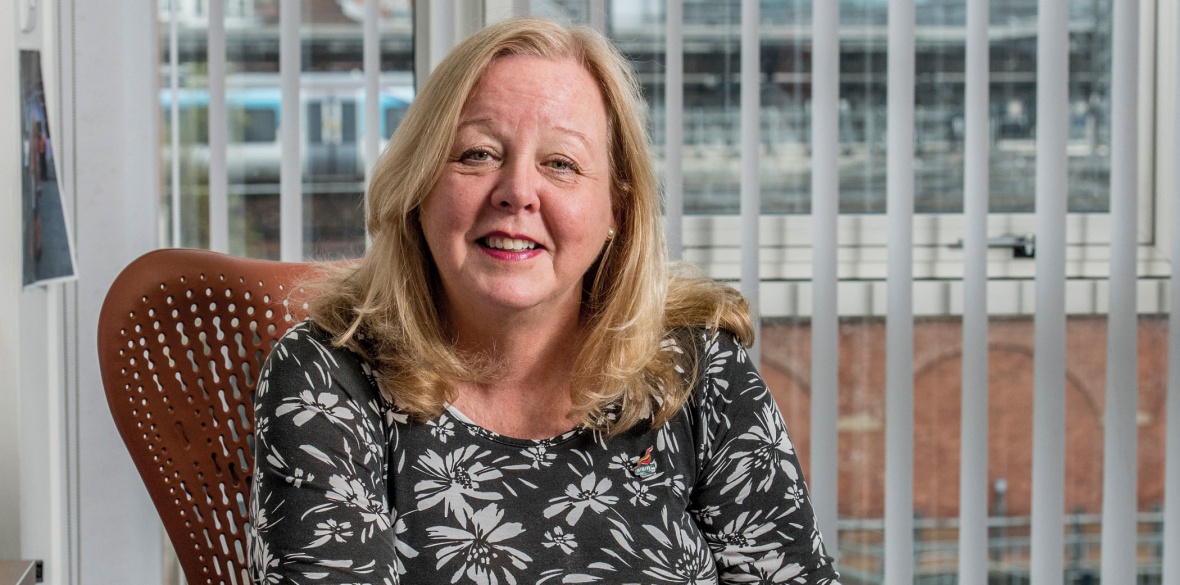This is the last article you can read this month
You can read more article this month
You can read more articles this month
Sorry your limit is up for this month
Reset on:
Please help support the Morning Star by subscribing here
IT’S A spirited region, the North East, Yorkshire and Humber, says Karen Reay, and she is proud of that.
As regional secretary of North East, Yorkshire and Humber region of Unite she oversees the industrial battles going on in the region — battles which the mainstream national media don’t report.
“I think as a region we have a reputation — we fight and we win,” she said.
“At one time this year we had 16 industrial actions taking place at the same time. As a union we have had well over 50 industrial actions since Christmas.
“The day you win is the day you get back into a negotiation with the employers and you get something that the members can accept. Industrial action is a last resort. But if our members decide to take action, we will give 100 per cent support.”
Reay has been Unite’s regional secretary for 12 years, and before that had been a Unite national officer, regional officer and lay rep in the National Health Service in Sunderland where she worked as a health visitor.
In her experience the attacks on working people by a ruthless Tory government and rampant employers are the most vicious she has ever seen.
“Things were bad before Covid, obviously, having had over a decade of Tory austerity,” she says.
“Brexit, Covid and a Tory government were a perfect storm,” she says, which emboldened the government and employers to use Brexit as a smokescreen to attack workers.
“Our region, the northern part of the country, has been hit so much more in relation to Brexit, with funding which we used to get drying up.
“Now we have families having to make decisions about whether to get clothes for their children, whether to turn the heating on. There’s never been such a time like it, when we need our unions to be strong.”
But there are significant positives.
“We are recruiting thousands of new members a month into Unite,” says Reay. “Our members, our reps, are phenomenal and they know they have the full support of the union behind them, both in our region and nationally, with a general secretary who is fully committed in support of the members. Sharon [Graham] is absolutely solid, determined. Her heart is in the union and her heart is to fight back for our members.”
She says unions are having to adapt their roles — but that, as always, fighting back is their foundation.
“The world of work has changed so much that we have had to reinvent ourselves again and again. You cannot sit back in your chair and say ‘this is wrong.’ We have to get up and do something about it,” she says.
“We are seeing the rich get richer in our country. But how many people are claiming universal credit even though they are in work? It’s over 40 per cent.
“It’s a disgrace. Poverty is relative to the society you live in. The point is how can a working person be paid such a low wage that they have to claim benefits, but the company they are working for is paying millions out to shareholders. It is a fundamental flaw in our society.
“Our region is different from some other regions,” Reay says. “We don’t have any massive employers. A lot of the big industries are no longer here, so we have a lot of employers with less than 300 workers. But fighting back is as relevant for smaller groups of workers as for those working for big organisations.
“We have had many industrial actions recently across our region, with huge wins in the bus industry and more recently we’ve just had a settlement on pay in the north-east at Switzer Marine on Teesside after the members’ solid industrial action.
“Our members are telling the employers: ‘You can’t keep giving us less.’ A 2 per cent pay rise is a pay cut. We have the financial evidence that these companies are making massive, massive profits.”
The future of every union lies in its new generation of members. Reay sees positive developments there too, but more needs to be done.
“Young workers are active, but in different ways,” she says. “They haven’t had the familial or community background that we had. They are more interested in what’s going on with the planet and other issues, and we have to take this on. We have to not necessarily reinvent, but to reflect on what we are doing.
“Young people will be fired up by different things. Their commitment and strengths are there, but we have to find the vehicle to bring them into our movement. We are custodians of our union and we have to leave it in a stronger position for the next generation.
“And we have got some brilliant young people in Unite. For example we’ve got four going over to Cuba on the union work brigade, supported by our region.
“The work brigades haven’t happened for the last two years during Covid, but we were inundated with young people wanting to go.
“They love it, and it changes them, and you can see how much they have learned and how much their eyes have been opened.
“We’ve got them involved in the Durham Miners’ Gala [July 9], and in the With Banners Held High festival in Wakefield [May 14].”
In some countries school curriculums include the history of the trade union movement — but not in Britain.
“We probably need to learn from Nordic countries that have so much more activity with young members,” says Reay. “I worked for a union in Sweden for a short time. Unions have a youth ombudsman going around colleges and workplaces. But over here, is trade unionism taught in schools? No.”
Not surprisingly her own three children, all adults, are trade union members.
“My kids are in a union not because I forced them, but because they were brought up to know what trade unionism is about,” she says.
As ever, most of the national media either ignores many workers’ struggles, or attacks them for having the effrontery to fight back.
“The media does not want workers to know what is happening. We have to rely on social media to spread our message,” she says.
“We support the Morning Star and ensure we use it as a vehicle to improve our communications. People can use the Morning Star to pick up what is happening in other regions, other areas, other sectors that are relevant to them.”
Unite is resuming other campaigning work in the region after the restrictions of Covid and lockdown.
“We have relaunched our Period Dignity campaign,” says Reay. “During Covid people were not in their workplace, and it wasn’t high on the priority list of employers. We’re now calling on employers to refocus their efforts and provide accessible sanitary products in the working environment.”
Reay is looking forward to another key event for the trade union movement returning this year, and its theme this year.
“The biggest event coming up this year is the Durham Miners’ Gala,” she says.
“This year the Gala will focus on recognising the important role that all our key workers have played during the pandemic but also for many years before that. And we need to understand what a key worker is. They are our bus drivers, lorry drivers, workers in the shops, in the factories supplying food, health workers and others — workers who keep the world going around.
“Sharon Graham will be on the platform speaking at the Miners’ Gala. I’ll be in the crowd. I’ve been going for so many years. That’s what I like, to be with our members, with our brass band. You couldn’t get a better day.”

 Peter Lazenby
Peter Lazenby










